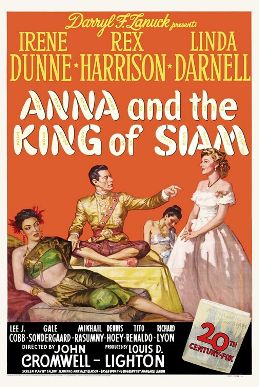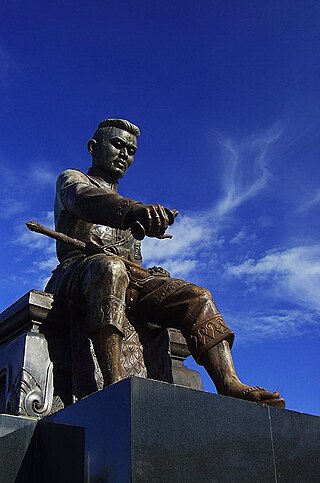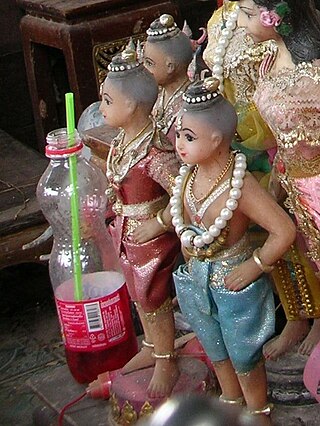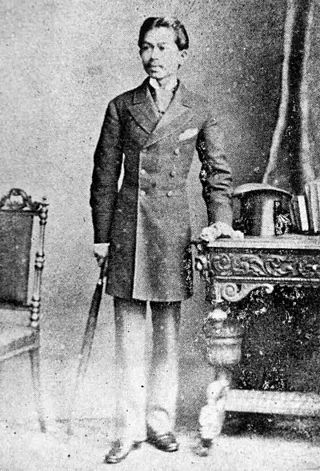 First edition (publ. Knopf) | |
| Author | John Burdett |
|---|---|
| Publisher | Alfred A. Knopf |
Publication date | June 5, 2007 |
| ISBN | 978-0-307-26318-6 |
Bangkok Haunts is a 2007 novel by English novelist John Burdett. [1] [2] [3] [4]
 First edition (publ. Knopf) | |
| Author | John Burdett |
|---|---|
| Publisher | Alfred A. Knopf |
Publication date | June 5, 2007 |
| ISBN | 978-0-307-26318-6 |
Bangkok Haunts is a 2007 novel by English novelist John Burdett. [1] [2] [3] [4]
Detective Sonchai, of the Royal Thai Police, is a former accessory to murder and a former Buddhist monk. A video is mailed to him anonymously. It is a snuff film of Damrong, a woman he once loved obsessively. [5] It turns out Damrong has masterminded her own death, and the recording of it, with proceeds going to her brother, a Buddhist monk.
Revenge is one of the novel's themes. Damrong takes revenge on her father by informing the police about one of her father's burglaries. The police in the countryside orchestrate her father's death, via the "elephant game" (the victim is placed into a spherical cage, of a type that elephants tend to start kicking, and thereafter stomp on when the sphere gets wedged into the corner of the arena). Damrong has prepared for her father's murder by bringing a camera with an expensive zoom, so that she can take detailed pictures of the execution.
In the novel's afterword, the author acknowledges inspiration from the following sources:

Vajiravudh was the sixth king of Siam from the Chakri dynasty, titled Rama VI. He reigned from 1910 until his death in 1925. King Vajiravudh is best known for his efforts to create and promote Siamese nationalism. His reign was characterized by Siam's movement further towards democracy and minimal participation in World War I. He had keen interests in Siamese history, archaeology, and literature, as well as economics, politics and world affairs, and founded the country's first university, Chulalongkorn University.

Anna and the King of Siam is an American 1946 drama film directed by John Cromwell. An adaptation of the 1944 novel of the same name by Margaret Landon, it was based on the fictionalized diaries of Anna Leonowens, an Anglo-Indian woman who claimed to be British and became governess in the Royal Court of Siam during the 1860s. Darryl F. Zanuck read Landon's book in galleys and immediately bought the film rights.

King Naresuan the Great or Sanphet II, was the 18th monarch of the Ayutthaya Kingdom and 2nd monarch of the Sukhothai dynasty. He was the king of the Ayutthaya Kingdom from 1590 and overlord of Lan Na from 1602 until his death in 1605. Naresuan is one of Thailand's most revered monarchs as he is known for his campaigns to free Ayutthaya from the vassalage of the Taungoo Empire. During his reign, numerous wars were fought against Taungoo Burma. Naresuan also welcomed the Dutch.

Vajirananavarorasa was the tenth Supreme Patriarch of Thailand from 1910 to 1921. He helped to institutionalize Thai Buddhism.

Wat Benchamabophit Dusitvanaram is a Buddhist temple (wat) in the Dusit District of Bangkok, Thailand. Also known as the Marble Temple, it is one of Bangkok's best-known temples and a major tourist attraction. It typifies Bangkok's ornate style of high gables, stepped-out roofs and elaborate finials.

Buddhism in Thailand is largely of the Theravada school, which is followed by roughly 93.4 percent of the population. Thailand has the second largest Buddhist population in the world, after China, with approximately 64 million Buddhists. Buddhism in Thailand has also become integrated with folk religion (Bon), Hinduism from millennia of Indian influence, and Chinese religions from the large Thai Chinese population. Buddhist temples in Thailand are characterized by tall golden stupas, and the Buddhist architecture of Thailand is similar to that in other Southeast Asian countries, particularly Cambodia and Laos, with which Thailand shares cultural and historical heritages. Thai Buddhism also shares many similarities with Sri Lankan Buddhism. Thailand, Cambodia, Myanmar, Sri Lanka and Laos are countries with Theravada Buddhist majorities.

The South Thailand insurgency is an ongoing conflict centered in southern Thailand. It originated in 1948 as an ethnic and religious separatist insurgency in the historical Malay Patani Region, made up of the three southernmost provinces of Thailand and parts of a fourth, but has become more complex and increasingly violent since the early 2000s from drug cartels, oil smuggling networks, and sometimes pirate raids.

The Erawan Shrine, formally the Thao Maha Phrom Shrine, is a shrine in Bangkok, Thailand, which houses a statue of Phra Phrom, the Thai representation of Brahma, the Hindu god of creation. The name also refers to Mahabrahma, the ruler of the Brahma realm in Buddhist cosmology.
Miss Suwanna of Siam, was a 1923 romance film written and directed by Henry MacRae, set in Thailand and starring Thai actors. It was one of the first feature films made in Thailand and the first Hollywood co-production in Thailand.

The Legend of King Naresuan is a Thai biographical historical drama film series about King Naresuan the Great, who ruled Siam from 1590 until his death in 1605.
John Burdett is an English crime novelist. He is the bestselling author of Bangkok 8 and its sequels. His most recent novel in this series, The Bangkok Asset, was published on 4 August 2015.

The Tak Bai Massacre or Tak Bai Incident was an event during the south Thailand insurgency that occurred on 25 October 2004 in Tak Bai, Narathiwat Province, Thailand, which resulted in the death of 85 Thai citizens.

Maha Chakkraphat was king of the Ayutthaya kingdom from 1548 to 1564 and 1568 to 1569. Originally called Prince Thianracha, or Prince Tien, he was put on the throne by Khun Phiren Thorathep and his supporters of the Sukhothai clan, who had staged a coup by killing the usurper King Worawongsathirat and Si Sudachan.

A kuman thong is a household divinity of Thai folk religion. It is believed to bring luck and fortune to the owner if properly revered. kuman, or kumara (Pali) means 'young boy' ; thong means 'golden'.

Crime in Thailand has been a defining issue in the country for decades, inspiring years of policy and international criticism. Drug use and corruption make up the majority of the crime in Thailand and due to this, many Thai administrations attempted to curtail the drug trade, most notably Thaksin Shinawatra with the 2003 War on Drugs. Since 2003 crime has been decreasing with the crime rate decreasing from 9.97 to 2.58. Despite this, juvenile delinquency has been increasing in recent years.

Prince PrisdangHis Highness Prince Prisdang birth name is His Serene Prince Prisdang. he was a member of the family of the Chakri dynasty of Siam and a Thai diplomat.

The National Council for Peace and Order was the military junta that ruled Thailand between its 2014 Thai coup d'état on 22 May 2014 and 16 July 2019. On 20 May 2014, the military declared martial law nationwide in an attempt to stop the country's escalating political crisis, and to force the democratically elected government out of office. On 22 May, the military removed the Yingluck Shinawatra government and formed the NCPO to take control of the country. The junta censored the broadcasting system in Thailand, suspended most of the constitution, and detained members of the Thai cabinet. The NCPO was formally dissolved following the swearing-in of the new cabinet on 16 July 2019. Critics like former Thai ambassador Pithaya Pookaman charge that the NCPO "...is practically still very much intact. Its arbitrary power[s] ... transferred to the existing Internal Security Operations Command chaired by the prime minister."
This article lists a chronology of events in the South Thailand insurgency from the 1960s. Most take place in the Muslim-majority, contested provinces of Narathiwat, Pattani, and Yala in the far south of Thailand bordering Muslim Malaysia.

Jatuporn Prompan is a Thai politician and activist. He is one of the core leaders of the National United Front of Democracy Against Dictatorship (UDD), also known as the "Red Shirts", and a former Member of Parliament of the Pheu Thai Party. In July 2017, he was given a one-year prison sentence for defamation.

Bronze Torso of Avalokiteshavara is a Srivijaya-era bronze torso depicting Avalokiteshvara, a Bodhisattava in Buddhism. It was discovered in Chaiya District, Surat Thani Province in southern Thailand and is currently in a collection of Bangkok National Museum. It is one of the most beautiful and most widely recognised sculptures of Avalokiteshavara in Thailand.